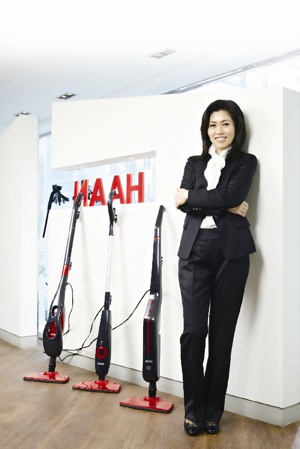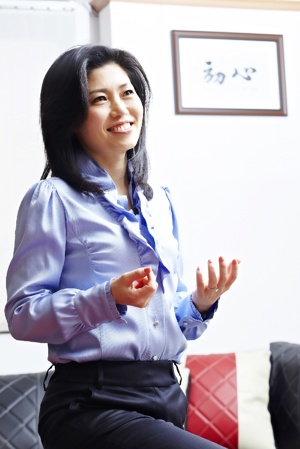
While painstakingly scrubbing her floor on all fours with cloth on her knees, a thought flashed through the head of Romi Haan (’86, French) that changed her life and subsequently those of many other housewives forever.
“I do not have to deal with this inconvenience if I find an easier way to do this,” Haan thought.
Although the simple thought may have occurred in many others’ minds then been forgotten, Haan continued contemplating it until 2001, when she visualized the world’s first steam cleaner. Recording annual sales in excess of 50 billion won from 2001 to 2005, not only Haan’s first product but also those that followed revolutionized the labor of housewives.
Now a famous female chief executive and founder of the HAAN Corporation and HAAN Beauty, Haan says it is important to ceaselessly question one’s surroundings instead of settling for the present, for inventions or innovations would not exist without such questions.
A household appliance and housewares company with annual sales of 150 billion won, the HAAN Corporation is famous in Korea for introducing housewives to new products that overcome housework inconveniences. Among many, Haan’s earliest and most well-known products include the steam cleaner and garment steamer. Likewise, through products such as the digital foundation applicator and heating beaurer mascara, HAAN Beauty combines technology with beauty to help women become beautiful faster and easier.
After launching successfully in Korea, the HAAN Corporation has reaped subsequent success in the Chinese and American markets, and Haan has been listed in the Wall Street Journal’s 2008 “Top 50 Women to Watch” as well as the Fortune Magazine’s “50 Most Powerful Women in Business: Asia.” Haan’s business philosophy requires being open to any ideas that may improve the quality of life for women, households, and mankind. Her goal for the HAAN Corporation and HAAN Beauty is to become a globally recognized household and beauty brand by the year 2020.
While Haan says that being a housewife herself has enabled her to understand women’s needs better and reflect those through her household products, her current position is the result of wandering through several jobs and withstanding friends and family’s opposition. Haan says her childhood was full of curiosity, ambition, and fearlessness of challenge, and led her to boldly face adversities later in life.
“To become independent from my strict father, I found a place to live by myself in front of the school when I was a sophomore,” Haan said. “I told my father that I was living with a couple of French friends to learn French. However, I was dragged back home after a month, and even my declaration to start working at a clothes company in Tahiti was thwarted by my father. Afterwards, I focused entirely on studying foreign languages, thinking that working abroad would be the only way to escape my father’s shadow.”
After graduation, Haan embarked on seveal career paths, including working for the International Olympic Committee of Switzerland, a hotelier, and a government official in Korea. When she finally announced she wished to leave her job again and start a business, everyone she knew opposed the idea except her husband.

“People insisted that quitting such a secure job and starting a new business were dangerous and foolish,” Haan said. “However, I had firm faith in my youth, and I was convinced that even if I bet all of my life on my new business and lost everything, I would still have enough time to start from scratch. Fearing minor failures will never bring one success.”
In addition to the challenge of starting a new business, Haan also had to face a thick wall of prejudice as a female CEO. Since a female CEO was relatively new and uncommon at the time, simply being a female was an excuse enough for discrimination.
When Haan applied for governmental support for her business, the evaluating consultant demanded her to confess what business her husband failed that led her to front the business for him. The consultant had said that looking up Haan’s husband’s identification number would reveal everything anyway, dismissing Haan’s experience and ability.
“Being underestimated even when I had considered myself to have more work experience than most men made me realize what kind of treatment ordinary women would receive,” Haan said. “From then on, whenever I had a chance to meet the heads of organizations or policy makers, I urged them to increase the number of female evaluators. This is because having only male evaluators is disadvantageous for women when females constitute at least half of the consumer population—even up to 70 or 80 percent in the case of products targeting women.”
In contrast to those days, Haan says she is told that there is now a greater percentage of female evaluators.
As a mother of two sons at home, Haan said balancing duties can be difficult at times. Because the three cannot spend long hours together, Haan says she tries to care more for her boys when they are together than she otherwise would.
Looking back on her career so far, Haan attributed her success to her “outsider” spirit—one that does not allow any obstacle to thwart her and strives to overcome her weaknesses to reach her goals. Haan said that the same attitude is necessary for students who wish to find their “real lives.”
“Once you set your mind on a dream, you need a spirit that will let you follow through with it and never give up,” Haan said. “In addition, having started my business career at age 36, I believe there is no such thing as a start that is too late. Do your best each day to achieve your dream, and your efforts will never betray you.”

